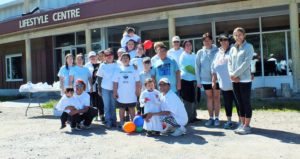Serpent River First Nation creates FASD awareness with third annual colour run

By Leslie Knibbs
SERPENT RIVER FIRST NATION—September 9 is recognized internationally as Fetal Alcohol Spectrum Disorder (FASD) Awareness Day. Large and small communities worldwide set aside this day to create more awareness of what some refer to as the hidden disability. Serpent River First Nation (SRFN) marked the day with its third annual FASD Colour Run to create more understanding of FASD in their home community.
FASD can affect anyone regardless of who they are, where they live or what nation they come from. We don’t blame anyone about FASD. Those affected with FASD can be affected with impaired brain capacity such as reduced sensory skills, lessoned academic skills, lack of focus, memory dysfunction, poor social skills, deprived communication abilities, debilitated executive functioning and cognitive skills such as thinking and reasoning.
SRFN Community Wellness Nurse, Amanda Cook helped organize her local community’s run encouraging many families and SRFN citizens to take part.
“It is important for us to recognize the need for health promotion and prevention,” Cook noted. “Alcohol and pregnancy do not mix.”
Three generations of the Simpson family participated in the run. Laurie Simpson and her daughter Amber with her two children Caiden and Ma’iingun in tow were eager to take part in the FASD event. Throughout her life, Grandmother Laurie always knew there was something different about her. Five years ago, she was diagnosed with FASD.
“My mom told me that she drank when she was pregnant.”
This was a revelation for Simpson. Following her diagnosis, Simpson began to understand the reason for some of her behavior patterns. Laurie has since registered with the Medical Alert bracelet program wearing the identification bracelet when she goes away for weekends. It’s been an ongoing struggle for Simpson dealing with FASD; getting help has not been easy for her.
“They should help the older people too, it would probably help the younger ones,” she said. The health care system focuses on infants and children first when dealing with FASD. Older adults are having more difficulty accessing services according to Simpson.
Parents, teachers, police, and some in the medical profession as well as others dealing with FASD share two dilemmas: recognizing the problem and then dealing with it effectively with knowledge, understanding and empathy. Recognition of FASD symptoms by stakeholders is perhaps the most important step forward in encouraging a productive life for affected individuals, not to mention a more helpful way of engaging with them and allowing necessary accommodation where and when needed. Events like Colour Run assist in creating more awareness.
Adjustments are made daily for those with blindness, deafness and other disabilities; this is not always the case when a person with FASD exhibits what is considered abnormal behavior. There is no remedy; however, prevention is possible. A mother should not consume alcohol during pregnancy. According to a recent ‘Canadian Addictions’ survey, 76% of women surveyed drank alcohol in the past year, 50% of pregnancies are unplanned, and “most women don’t know they are pregnant until six weeks or more into their pregnancy.”
All families participating in the SRFN FASD Colour Run finished the course starting at the Pow Wow grounds and travelling through the village to the Lifestyle Centre for a catered luncheon. The first runners to complete the course were Lois Bomberry, now a community wellness nurse in SRFN formerly from Oshwegan in Six Nations territory.


